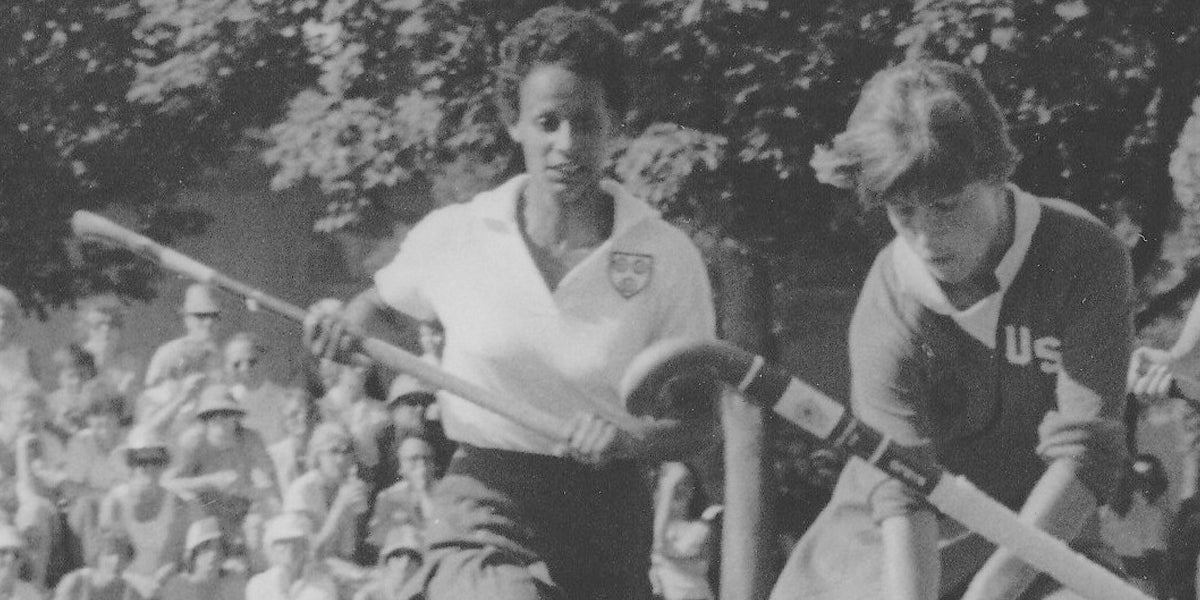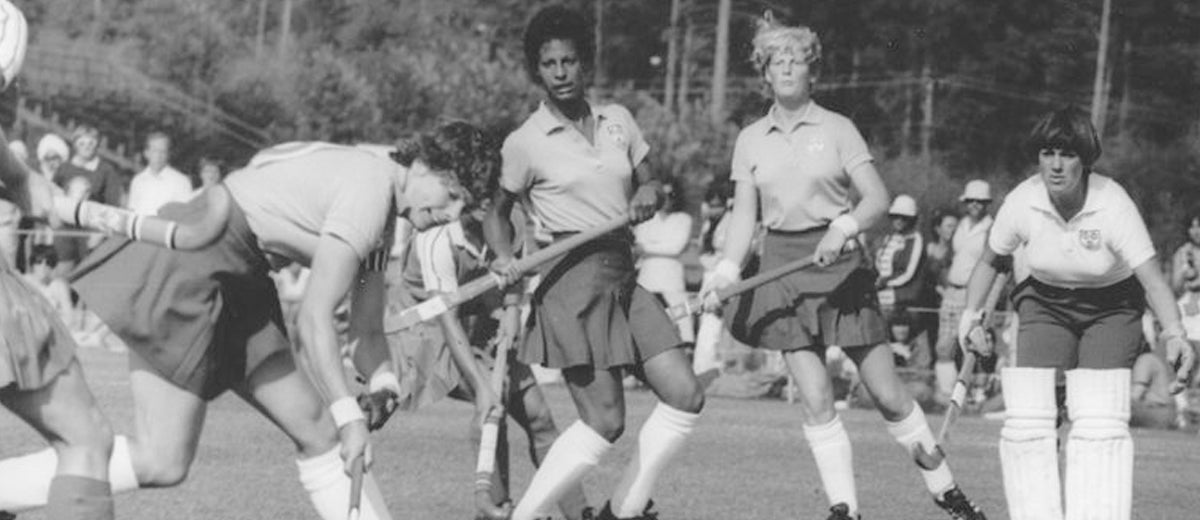- Hockey History
Her story: England and Great Britain's first-ever Black Female Player

As part of Black History Month and with the help of the Hockey Museum; England Hockey is sharing stories from some significant figures in the sport's history.
Rosie Sykes was the first black woman to play for England's national hockey team when she made her debut in 1978, and she took time out to look back on a trailblazing career for both England and Great Britain.
My late mother was English, my father was Nigerian. They married and went over there, I was born in Lagos but the marriage broke down so my mother came back to Kent. We arrived here in January, freezing and I've never experienced anything like that and had never seen snow! Having to go to school was a real culture shock.
I actually remember playing shinty at school and I could hit the ball hard and accurately. Then at secondary school my PE teachers - both male and female - introduced me to hockey. We only had one team for the whole school and they said I should join Thanet Nomads. The club took me under the wing, they'd pick me up for games and encourage me.
I remember going to Wembley to watch the England women's hockey team, because our school always used to go. I remember sitting there, looking down at the likes of Val Robinson and thinking I want to be there, I can do this. My teachers said I was good enough, I was about 14 or 15 I think, when I made it my goal to play internationally.
Of course at the time there were no other black faces. I don't remember any at school, certainly not in the hockey team. I was very much the lone black player, even when I started playing for Kent I only remember one other black player. Wherever I went in my life I was the only black face though so I got used to it. Now you see the ethnic mix of families, it's great to see, but it wasn't anything like that when I was at school.
If I hadn't been encouraged to play I don't think I could have done it. My mum was bringing up four children on her own with not much money, so I'm so grateful to the people who helped me. And living out on the edge of the country, going anywhere was a real trek, leaving at 5am even as a junior! I was determined because you had to be.
I'd been playing for my club for a number of years into adulthood and we had what were known as Territorials with all the counties playing on grass just after Christmas in Folkestone, you can imagine the weather! From those matches the England team was picked, which was very exciting. The feeling when I was selected for England was a big sigh of relief, and there were people who said 'at last you've done it, it should have come sooner,' and I remember my club Ashford had a big party and always supported me with a big banner at Wembley when I got to play there.
When I got called up I was teaching so I was in my late twenties. People said 'better late than never' but I only ever thought I just hard to work a bit harder and get myself noticed. People said to me later maybe it was a race thing but I couldn't possibly say that was the case. Maybe the selectors were conservative people all from a similar background, but like I say, lots of people had disappointments, lots of good players missed out and it just made me keep going. Oftentimes people came into the side and never came back, but once I got in I was a fixture in the squad and I felt it was my time.
How did it feel being the first black woman to play for England? I just felt it was great I'd got that far. Being black wasn't part of it to me. Perhaps to other people it was, but I just wanted to play. I did one or two interviews with newspapers and was likened to Viv Anderson who was the first black footballer for England at the same time. There wasn't a lot of hype and actually my uncle to this day says people didn't make enough of a fuss but I'm OK with that. It was other people rather than me saying that.
In terms of prejudice, by the time I got to England I never came across anything, although I had done previously at County level. I remember there being prejudice and also a lot of rivalry there. I stuck it out because I was determined to show that I was worth my place. I could easily have given it up then but my club, my family, my school were so supportive I didn't feel I could let them down. I could put up with it for the County in order to get through and play at a higher level, which of course I did.
My first game was against versus Wales at Llanelli in 1978 but I'd stupidly damaged my knee playing squash. I didn't know if I'd be fit to play but someone said to me to try the nearest football club, and lo and behold Tottenham were a huge help. They said 'yes no problem I'll get you ready.' My boss gave me the day off to go up to get treatment and advice from Spurs, so then I was able to play.

It was a whirlwind early on; debut in 1978; World Cup in 1979 and then in 1980 we qualified for the Olympics. But it was Moscow and Mrs Thatcher in her wisdom decided we would pull out. Team sports like hockey were all funded through government so that was it. Zimbabwe won gold against Czechoslovakia, and we were gutted to miss out because we had such a good chance. When the youngsters at my school get the story out of me, they get so irate and say I should've sued which is quite funny. They can't understand, but that's politics and sport with the athletes as the victims.
Then with regards 1984 in Los Angeles, we played all the qualifying matches but it was literally two weeks before we flew out and we were told we hadn't played enough games. I think the men's team may even have already flown out. There was an admin error somewhere, I've no idea whose fault it was but it was all brushed under the carpet and that was that. It was doubly galling because it was LA with the Americans putting on a show. We'd supported them in 1980 but then nothing seemed forthcoming in terms of help. You can imagine, after all that training, you're at your peak. We were crushed and didn't want to talk about it. I'm alright now but at least we were a team who could support each other. After that I felt I wasn't going to try for another Olympics; life moves on. I kept playing for Ashford which was great for the social, but once you've been up at the top it changes a little so I decided to focus on my teaching career.
I'm still one of the Vice Presidents at Ashford now but they all play golf which I don't! My grandson is six and he's started playing, he loves it which is the main thing. Unfortunately there's not so much hockey at school which is a sadness, those schools that can't afford an astro find it hard so you can't blame them. It's a fantastic sport and we just need it to be out there so people can be inspired to play. Not let them think it's a posh game, which is often said.
Looking back at my international career, I absolutely loved my time, it was brilliant. I remember when I was first picked for England, it was such a privilege to be able to play with other people who were at the same sort of level. I always felt so comfortable in that environment. By the time you get to the top, you've made it and so there isn't the same sort of rivalry that you have lower down. I've still got the same friends and one of the groups has a monthly Zoom call; it's like we've never been away, it's wonderful. I look back on those days with great pride.
The Hockey Museum (THM) is the first and only museum of hockey in the world. It aims to preserve, share and celebrate the rich history and heritage of the sport of hockey. For more details visit www.hockeymuseum.net
